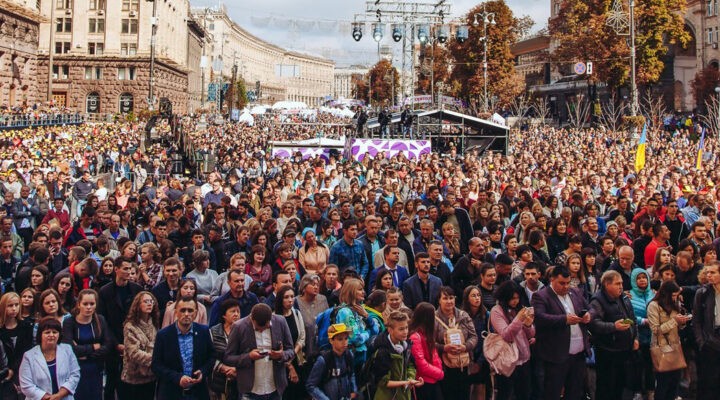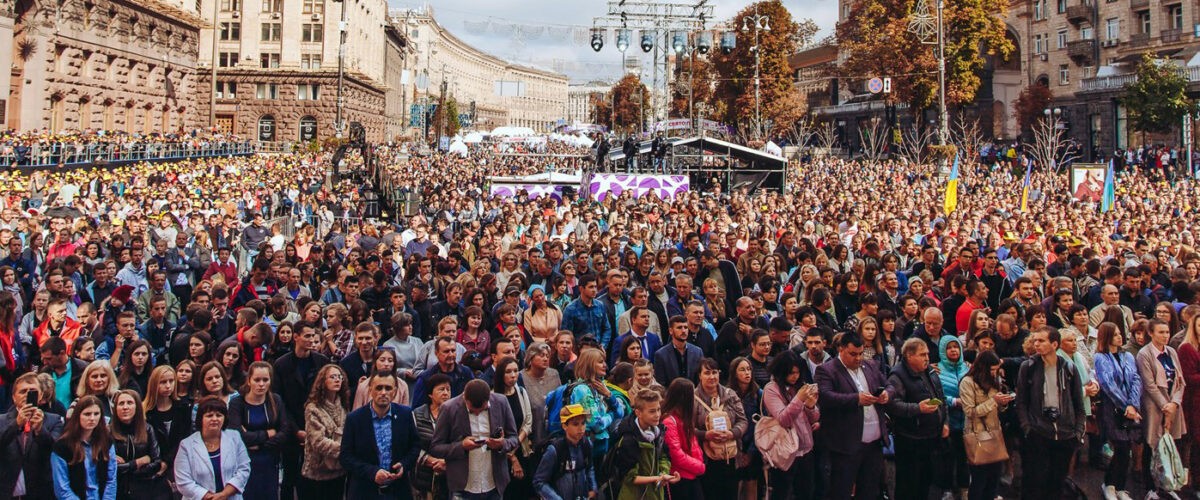If Vladimir Putin wanted to invade a former Soviet-bloc country and get the blessings of American Christians, he might have done better than choosing Ukraine.
Among all the countries that once made up the USSR, Ukraine today stands out as among the most religiously diverse and has the largest presence of evangelical Christians, including Baptists.
Thus, while a few far-right American politicians and a few far-right evangelical leaders have sided with Putin in his unprovoked bloodbath in Ukraine, the vast majority of American Christians — including evangelicals — have thrown their support behind the people of Ukraine and not Putin.
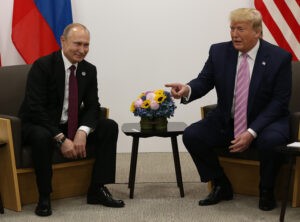
Then-U.S. President Donald Trump (R) and Russian President Vladimir Putin attend their bilateral meeting at the G20 Osaka Summit 2019, in Osaka, Japan, June,28,2019. (Photo by Mikhail Svetlov/Getty Images)
That, in turn, has created a unique breaking point between white evangelicals in America and former U.S. President Donald Trump, who before this war appeared inseparable. Trump continues to praise Putin, as does a small segment of white evangelicals.
While American evangelicals previously found alignment with Russia on opposition to abortion and homosexuality, most appear unwilling to sacrifice the kind of religious freedom and Christian witness they have seen in Ukraine.
In fact, a surprising number of Americans have visited Ukraine, often on church-sponsored mission trips.
This is why religion researcher Ryan Burge recently pushed back against the prevailing narrative that white evangelicals support Putin over Ukraine. On March 10, he tweeted: “Can we pump the brakes on the narrative that white evangelicals love Russia/Putin, please? It’s just not supported by polling data.”
Burge, who also is an American Baptist Churches USA pastor, linked to a March 10 Washington Post article reporting on a Feb. 20-24 Washington Post-ABC News poll. That poll was taken immediately before the Russian invasion but during the period in which the United States and other countries had begun imposing sanctions on Russia because of the impending invasion.
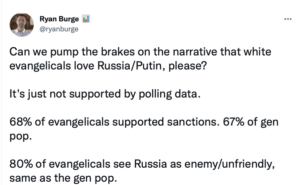 Its findings: “White evangelical Christians were just as negative toward Russia and supportive of sanctions as Americans overall. Among white evangelicals, 47% said Russia is an enemy of the United States and another 33% said it is unfriendly. Similarly, 68% supported sanctions and 51% said they would still support them if energy prices went up.”
Its findings: “White evangelical Christians were just as negative toward Russia and supportive of sanctions as Americans overall. Among white evangelicals, 47% said Russia is an enemy of the United States and another 33% said it is unfriendly. Similarly, 68% supported sanctions and 51% said they would still support them if energy prices went up.”
Do the math, and you’ll see that leaves 20% of white evangelicals who don’t see Russia as an enemy of the U.S. or unfriendly toward the U.S.
The evangelical-Russian alliance
And as with so many things that mix theology, culture and politics, that pro-Russia 20% is very loud and knows how to get attention.
This reality was explained by Anthea Butler writing for MSNBC on March 1. Butler is an expert on race and religion and chairs the department of religious studies at the University of Pennsylvania.
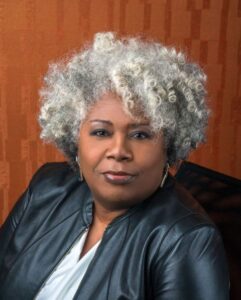
Anthea Butler
She wrote: “While the world looks on in horror as Russia’s invasion of Ukraine unfolds, one group has been praising Russian President Vladimir Putin. It turns out Putin has a fan base in America’s right-leaning evangelical politicians and pundits.”
Butler cited Lauren Witzke, a Republican candidate for Senate in Delaware, who told this year’s gathering of the Conservative Political Action Conference: “Here’s the deal. Russia is a Christian nationalist nation. They’re actually Russian Orthodox. … I identify more with Putin’s Christian values than I do with Joe Biden.”
The professor then explained: “This isn’t an uncommon stance among some Republicans and white American evangelicals today, who have previously admired Putin because of the alignment of their beliefs with his about homosexuality, authoritarianism and fealty to former President Donald Trump. Many believe Putin’s nationalism, coupled with their Christian belief, is the way America should be.”
From Billy Graham to Franklin Graham
Attitudes of American evangelicals toward Russia have changed considerably since the height of the Cold War. Butler recalled that in the 1950s, “Billy Graham preached against the evils of communism and called then-Soviet states ‘godless’ and a threat to Christianity and America.
“Fast-forward to the 21st century, and today’s evangelical leaders, as well as Republicans, have embraced Russia — and, more specifically, Putin. In 2014, Putin made the cover of the evangelical magazine Decision in a piece in which Graham’s son Franklin lauded his handling of the Winter Olympics and his protection of Christians. Franklin visited Russia in 2015, and ever since, has promoted Putin as a godly leader. A few days before the invasion of Ukraine, he asked people to ‘pray for Putin’ but not for Ukrainians, creating a decent amount of backlash.”
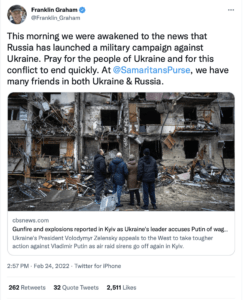 And indeed, a review of Franklin Graham’s prolific Twitter posting shows that even after that pre-invasion stance, the younger Graham has added calls to prayer for the people of Ukraine while not condemning or even mentioning Putin. Not once.
And indeed, a review of Franklin Graham’s prolific Twitter posting shows that even after that pre-invasion stance, the younger Graham has added calls to prayer for the people of Ukraine while not condemning or even mentioning Putin. Not once.
On Feb. 24, the day the Russian invasion began, Graham tweeted: “This morning we were awakened to the news that Russia has launched a military campaign against Ukraine. Pray for the people of Ukraine and for this conflict to end quickly. At @SamaritansPurse, we have many friends in both Ukraine & Russia.”
In the three weeks since, Graham’s Twitter feed has alternated between condemning U.S. President Joe Biden, praising Florida Gov. Ron DeSantis and the Florida Legislature for pushing through anti-gay legislation, and reporting on the compassionate care his organization, Samaritan’s Purse, is providing to the people of Ukraine. While never again mentioning the source of that suffering: Putin’s Russia.
As Butler wrote for MSNBC: “As things escalate in Ukraine, evangelicals and Republicans alike are faced with a hard choice: How do they support the authoritarian policies of Putin while Ukraine and its evangelical population face the horrors of war? I suspect it will be difficult for evangelicals and Republican officials to continue to be as effusive as their idol, Trump, has been about Putin. Because if they indeed believe in the so-called family values of the church, the images we’re seeing of Ukrainian parents’ being separated from their children to escape Russian forces is much harder to justify.”
 The same was said by Dartmouth history professor Bethany Moreton writing for the Washington Post. Moreton is the author of Slouching Towards Moscow: American Conservatives and the Romance of Russia.
The same was said by Dartmouth history professor Bethany Moreton writing for the Washington Post. Moreton is the author of Slouching Towards Moscow: American Conservatives and the Romance of Russia.
“Many on the American right see Russia as an ally in the culture wars. This long-standing alliance has forced a rift within the Republican Party since Russian President Vladimir Putin’s invasion of Ukraine,” Moreton explained. “Even with mounting civilian casualties this week and a growing humanitarian crisis, former President Donald Trump’s most ardent supporters refuse to condemn his remarks about the ‘smart’ invasion.
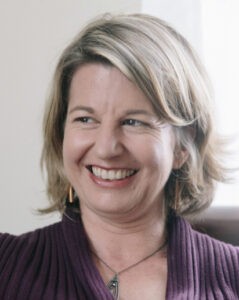
Bethany Moreton
“But there is another dimension to this rift …: how this alliance of cultural conservatives in the United States and Russia has also embraced racial and ethnic bigotry. White evangelicals once saw Russia as an existential threat to traditional gender roles and sexual morality, but over the past three decades, they have forged a partnership in a global family values movement that not only embraces sexual and gender traditionalism but sees these practices as a solution to demographic changes around the globe.”
Moreton then makes the link between Putin, Graham and DeSantis: “In fact, GOP-proposed state-level anti-transgender and ‘Don’t Say Gay’ bills actually echo Russian laws — which isn’t surprising since U.S. conservatives contributed to the Russian legal prohibitions.”
Evangelicals in Russia
Even the leader of the Russian Evangelical Alliance has taken a bolder stance than Franklin Graham.
Christianity Today reported that REA General Secretary Vitaly Vlasenko wrote a March 12 open letter in which he stated his “bitterness and regret” over decisions taken by his government and explained: “I mourn what my country has done in its recent military invasion of another sovereign country, Ukraine. In the worst-case scenario, I could not imagine what is now being observed.”
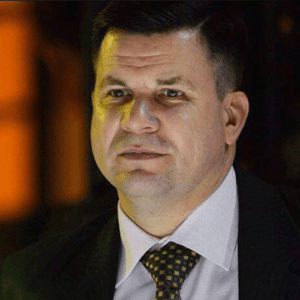
Vitaly Vlasenko
This in the current political context of Russia where citizens may be imprisoned for up to 15 years for spreading “fake news” that “discredits” the Russian military.
Christianity Today noted that just two days earlier, a Russian court fined an Orthodox priest 35,000 rubles ($261) for discrediting the army during his Sunday sermon.
“Everything I could do to prevent war, I did,” Vlasenko lamented. “I apologize to all those who have suffered.”
Evangelicals in Ukraine
Leaders of the Ukrainian Baptist Union have been outspoken in their opposition to the Russian invasion and have named Putin as the reason for the immense suffering of their people. Throughout Ukraine, most religious leaders have taken similar stands, even among the Orthodox who share direct religious connections to Russia.
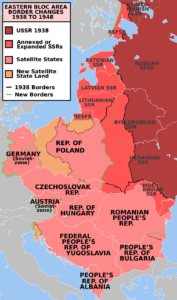
Source: Wikipedia
The context of religion and religious freedom in Ukraine is unlike that of any other former Soviet-bloc nation, according to Catherine Wanner of Pennsylvania State University, who in 2006 wrote an essay on “Evangelicalism And the Resurgence of Religion in Ukraine.”
“Dramatically different policies regulating religious organizations have been adopted in Ukraine, Russia and Belarus,” she wrote. “Ukraine offers far more freedoms to non-traditional religious communities and foreign religious organizations than many other successor states. This, in turn, has generated greater religious diversity and higher levels of religious participation in Ukraine. In particular, there has been a notable increase in the number of Baptist and Pentecostal communities since 1991.”
Such diversity allowed Ukrainian evangelicals to connect with a global community of believers, Wanner said. “By introducing new practices, knowledges and moralities, these global communities remake identities, allegiances and political orientations. The attraction of these communities and the role they play in developing and strengthening of civil society in Ukraine is likely to continue.”

Catherine Wanner
Ukraine was especially ripe for such a future, Wanner explained. “Before the USSR collapsed in 1991, Soviet Ukraine was home to the second largest Baptist community in the world, after the United States. Another 350,000 Pentecostals, or half the total of officially registered Pentecostals in the Soviet Union, resided in Soviet Ukraine. Ukraine was also home to numerous underground communities of both denominations. With good reason, Ukraine was called the ‘Bible Belt’ of the former Soviet Union.”
Similar views are expressed by Esther Grace Long, who in 2005 was assistant professor of geography at Morehead State University in Kentucky. That year, East West Report published a portion of her doctoral dissertation from the University of Kentucky under the title “New, Western-Oriented Evangelicals in Ukraine.”
She cites transnationalism — defined as “cultural, economic and demographic processes working across territorial boundaries — as a key part of the story.
“The arrival of religious freedom led directly to the development of transnational linkages between religious organizations in Ukraine and religious organizations in other countries. This has happened in virtually all faith communities, from Orthodox to Protestant to Jewish to Muslim,” she wrote. “Although Ukrainian Baptist churches have a history of interaction with the West that dates back to the 19th century and that continued, albeit in a limited way, during the decades of the Soviet Union, transnational networking has flourished at a new level since the era of glasnost and Ukraine’s independence in 1991.”
It is this transnationalism that has created links between Ukrainians and Americans and today strengthens the empathy expressed by American Christians for a country under siege.
“Most Ukrainian cities, and many small towns, now boast new Baptist church buildings constructed primarily with Western funds and Ukrainian labor.”
As of 2005, Long wrote: “Most Evangelical Christian-Baptist churches work with American groups in a variety of evangelistic, humanitarian, educational and building projects. It is not uncommon for large urban ECB churches to receive hundreds of thousands of dollars from Western supporters, primarily for church building projects. Most Ukrainian cities, and many small towns, now boast new Baptist church buildings constructed primarily with Western funds and Ukrainian labor. Western short-term teams have worked alongside Ukrainian Baptists in children’s camps, evangelistic projects, English classes, medical ministries, and construction projects. Some missionaries have worked with ECB churches for longer periods, helping establish Bible colleges and seminaries (such as Tavriskiy Christian Institute in Kherson) and other ministries.”
Enter the World Council of Churches
While Baptists and other autonomous Protestant churches often have kept ecumenical partnerships at arm’s length, the current situation in Ukraine has caused many a Baptist pastor in America to quote and commend the work of the World Council of Churches. That international religious body has called out Putin’s aggression by name and put the patriarch of the Russian Orthodox Church on notice.
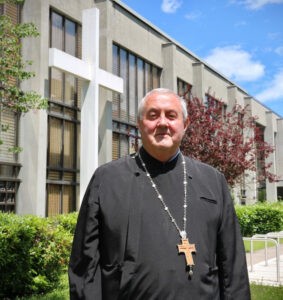
Ioan Sauca
On March 2, Ioan Sauca, a Romanian Orthodox priest who is acting general secretary of the World Council of Churches, wrote to Russian Orthodox Patriarch Kirill with a plea for him to intervene against the war.
“It is with great pain and with a breaking heart that I am writing to Your Holiness. The tragic situation of the war in Ukraine has brought tremendous suffering and loss of lives. Many of our brothers and sisters had to leave their homes — including the elderly, women, and children — to save their lives. The whole world is looking with concern and expects to see a sign of hope for a peaceful solution. I receive letters every day from different parts of the world, from church leaders and the faithful of our WCC constituency asking to approach Your Holiness to mediate so that the war can be stopped and the great suffering ended. In these times of hopelessness, many look at you as the one who could bring a sign of hope for a peaceful solution.”
On March 10, two weeks into the Russian invasion of Ukraine, Kirill wrote him back with a lengthy reply, noting that the two men have known each other “for many years.”
The patriarch, who in a sermon the week before had blamed the war on Gay Pride parades, again deflected Russian responsibility.
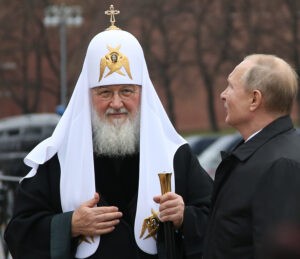
Russian President Vladimir Putin and Orthodox Patriarch Kirill at Red Square on November 4, 2019, in Moscow, Russia. (Photo by Mikhail Svetlov/Getty Images)
“As you know, this conflict did not start today. It is my firm belief that its initiators are not the peoples of Russia and Ukraine, who came from one Kievan baptismal font, are united by common faith, common saints and prayers, and share common historical fate,” Kirill wrote. “The origins of the confrontation lie in the relationships between the West and Russia. By the 1990s Russia had been promised that its security and dignity would be respected. However, as time went by, the forces overtly considering Russia to be their enemy came close to its borders. Year after year, month after month, the NATO member states have been building up their military presence, disregarding Russia’s concerns that these weapons may one day be used against it.”
According to Kirill, NATO forces want to make “the brotherly peoples” of Russia and Ukraine become “enemies.”
“They spared no effort, no funds to flood Ukraine with weapons and warfare instructors. Yet, the most terrible thing is not the weapons, but the attempt to ‘re-educate,’ to mentally remake Ukrainians and Russians living in Ukraine into enemies of Russia.”
After reciting a litany of perspectives that resonate with the Kremlin’s political talking points, the patriarch concludes: “I express my hope that even in these trying times, as has been the case throughout its history, the World Council of Churches will be able to remain a platform for unbiased dialogue, free from political preferences and one-sided approach.”
And he signed the letter, “with paternal love.”
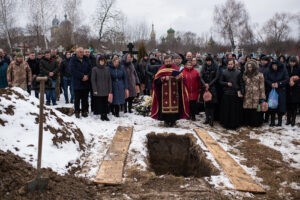
A local priest conducts the service for Denys Hrynchuk at the cemetery in Bila Krynytsia on March 6, 2022, in Chernivtsi region, Ukraine. Denys Hrynchuk served in the Ukrainian army. He was killed on Feb. 28, 2022, near Volnovakha, Donetsk region. He is survived by his mother, five brothers and a sister, his wife and his one-year-old son. Ukrainians from the eastern and central parts of the country have increasingly fled to western cities as Russian forces advance toward Kyiv from three sides. Russia’s large-scale invasion of Ukraine has prompted widespread condemnation from European countries, coupled with sanctions on Russia and promises of military support for Ukraine. (Photo by Alexey Furman/Getty Images)
Sauca wasn’t moved. The next day, he issued a statement saying the WCC “is appalled by the escalating impact of the conflict in Ukraine on civilians — the women, men and children of Ukraine — and by what appears to be increasingly indiscriminate attacks.”
“The airstrike on the Mariupol Hospital No.3 on March 9, attacks affecting other hospitals, schools, kindergartens and residential areas, and the rising toll of civilian deaths and injuries all indicate that international humanitarian law is being disregarded. Reports of the use of cluster munitions, including in populated areas, and of area bombardment of towns and villages, are deeply disturbing. The WCC denounces all such violations of international humanitarian law, particularly concerning the protection of civilians, which may amount to war crimes and crimes against humanity.
“Both as a matter of international law and of fundamental moral principles, we appeal for an immediate end to such indiscriminate attacks, for respect for international humanitarian principles and the God-given human dignity and rights of every human being, and for a ceasefire and negotiations to end this tragic conflict.”
This dialogue between the head of the Russian Orthodox Church and the leader of the World Council of Churches has made international headlines — and has crossed denominational and interfaith borders in its commentary.
It is, in the words of Esther Grace Long, “transnational.”
Related articles:
Religious liberty in Ukraine is ‘doomed’ if Russian invasion succeeds
Mercer scholars explain the immense danger of Putin’s power play in Ukraine
Ukrainians want peace, regardless of their religion | Analysis by Robert Sellers

